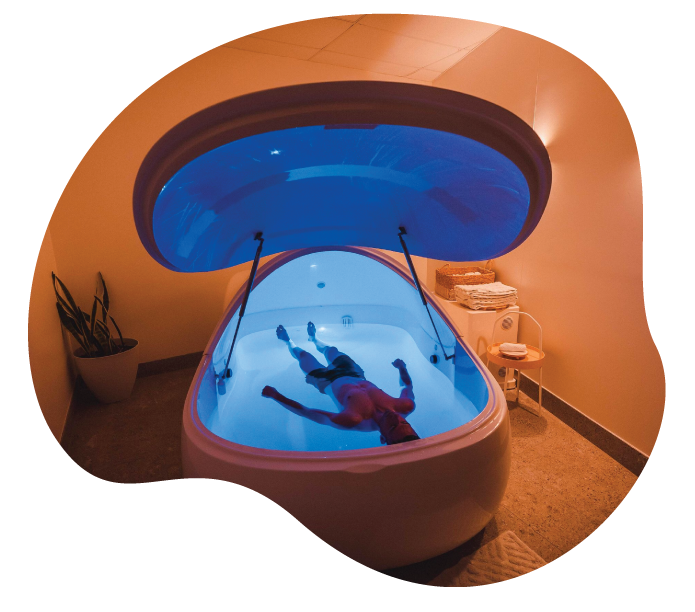Dive into Relaxation and Wellness: Discovering the Amazing Benefits of Float Therapy (aka Sensory Deprivation Therapy) for Pain Relief, Sleep Quality, and More


Grant Ian Gamble is a best-selling mindful leadership author and speaker. He has over 30 years of experience in leading teams to create innovative customer experiences, building engaged workforces, and developing leaders who prioritize mindfulness in their approach.
What is Float Therapy or Sensory Deprivation Therapy?
Float therapy, also known as sensory deprivation therapy, is a type of treatment that involves floating in a tank or pool filled with salt water. This therapy has gained popularity in recent years as a way to promote relaxation and wellness. In this article, we will explore what float therapy is and the benefits it offers.
Float therapy involves floating in a tank or pool filled with salt water. The water is heated to body temperature and contains a high concentration of Epsom salts, which allow the body to float effortlessly.
During a float therapy session, the patient lies down in the tank or pool and floats for a designated period of time. The therapy is designed to be a relaxing and meditative experience.
Benefits of Float Therapy or Sensory Deprivation Therapy
- Relaxation
Float therapy can promote relaxation by reducing stress and anxiety. The therapy can stimulate the production of endorphins, which are natural mood-boosting chemicals produced by the body.
- Pain Relief
Float therapy can provide pain relief for various conditions, including arthritis, fibromyalgia, and back pain. The therapy can help to reduce inflammation and promote healing.
- Improved Sleep
Float therapy has been shown to improve sleep quality by promoting relaxation and reducing anxiety. The therapy can also stimulate the production of melatonin, a hormone that regulates sleep.
- Enhanced Athletic Performance
Float therapy has been shown to enhance athletic performance by reducing muscle soreness and improving recovery. The therapy can increase blood flow and oxygenation to the affected area, allowing the body to recover more quickly.
- Improved Mental Health
Float therapy has been shown to improve mental health by reducing symptoms of depression and anxiety. The therapy can promote relaxation and provide a sense of calm and well-being.
Float therapy is a safe and effective treatment that offers a range of benefits for various health conditions. This treatment can promote relaxation, provide pain relief, improve sleep quality, enhance athletic performance, and improve mental health. If you are considering float therapy, it is important to consult with your healthcare provider to determine if it is a suitable treatment option for your specific condition.
Your Ultimate Recovery Guide: Unlocking the Secrets to Peak Performance, Health and Well-being

Put PEOPLE FIRST, ALWAYS and watch your business flourish.
Dive deep into the latest trends in customer experience and team engagement, mindful leadership and management. Discover practical tools and strategies that you can use to build a people-centric culture, the foundation for sustainable long-term business growth and success.
Led by mindful leadership expert, Grant Ian Gamble, a best-selling author and true visionary with over 30 years of experience in leading teams to create innovative customer experiences, building engaged, inspired and fulfilled workforces, and developing leaders who prioritize genuine connection in their approach.
The guiding principle behind all of Grant’s work is PEOPLE FIRST, ALWAYS.
More Articles:
Are You Truly Leading or Just Managing? You Need Real-Time Feedback
Great leadership is a journey. Yet, many top-tier leaders fall into the trap of believing they have arrived. After years of experience and success, it is easy to assume that your leadership is foolproof.
But true leadership is not about titles or tenure—it is about service, adaptability, and a relentless commitment to growth.
The best leaders do not operate in an echo chamber. They do not rely on assumptions or past successes to guide their decisions. Instead, they actively seek feedback—real-time, honest, unfiltered feedback—from both their Team Members and Customers. They understand that leadership is not about them—it is about the people they serve.
Is Elon Musk Wrong?
Elon Musk famously said, “Empathy is not an asset”.
Musk learned this from the video game Polytopia, which he played with his brother, coworkers, and partners. He made a list of life lessons from the game, which he calls Polytopia Life Lessons.
Musk’s indifference to empathy is not isolated when you look at notoriously ruthless business leaders such as Jeff Bezos, Bill Gates, and Steve Jobs. They have all had difficulties with interpersonal dynamics and yet been incredibly successful by the mainstream’s definition of success.
Embrace Workplace Wellbeing: Navigate Stress, Anxiety, Overwhelm and Burnout with AFFINITY OS’s™ NEW Psychosocial Risk (PSR) Management Tool
A state of stress, anxiety, overwhelm and burnout feels almost endemic these days. I hear it from friends, family members, work mates and peers. The pressures seem to come from all directions—work, media, global events, and personal life demands. Everywhere you turn, there’s more information, more conflict, more polarization, more uncertainty and it feels as if it’s escalating, relentlessly. This growing sense of overwhelm isn’t just affecting individuals; it’s affecting entire organizations, from the mental wellbeing of team members and tenure to overall workplace productivity.
Fill out the form below and receive a PDF download of "6 Key Strategies to Engage Untapped Fitness and Wellness Market Segments"
Let's Connect!
CUSTOMER EXPERIENCE, TEAM ENGAGEMENT & WORKPLACE WELL-BEING: AFFINITY OS™ | WELLNESS INTEGRATION | MINDFUL LEADERSHIP: "THE AFFINITY PRINCIPLE"
0475 866 592

The Affinity Principle™ by Grant Gamble presents a formula for business success through a people-centric, mindful leadership approach.
PEOPLE FIRST, ALWAYS.








